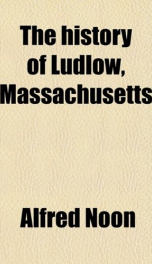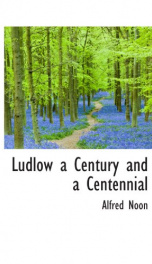the history of ludlow massachusetts

Purchase of this book includes free trial access to www.million-books.com where you can read more than a million books for free. This is an OCR edition with typos. Excerpt from book: THE HISTORY ANTE-LUDLOW "ho constitute a townThe red manIndian namesRelics of a departed raceAn ancient armorLegend of camp firesOf the LeapOf the alleged Facing Hills murderThe tenure of soilSpringfield of old Charles ILA Yankee trickThe commonsSections of commonsLine of commonsAllotmentsThe riverEarly settlersThe tar businessJoseph MillerOthersA wooingGlimpse at the regionChurch serviceProposition for districtWill they get an organization? A COUNTRY, a state, a town, consists of the inhabitants thereof. Whatever the place is, or fails to be, depends not upon the conditions of its soil or weather, so much as on the people enjoying or braving the same. Spain, in the most favored of latitudes, may fail to influence its nearest neighbors, while a band of hardy colonists among the frozen seas, singing their sagas while reefing the sails of rude smacks, may make the name of Iceland famous. Our first acquaintance, then, will be with the earlier inhabitants of the territory now known as Ludlow. The history of the region before the paleface had appropriated these lands is preserved only in tradition. Some portions of these broad acres were, evidently, favorite haunts of the red man. The names Mineachogue and Wallamanumps preserve the flavor of the aboriginal. The former name seems to have been applicable to the whole eastern region of Wilbraham and Ludlow, and signifies "Berry land." The latter word seems to have been applied to falls of the "Chicuepe," now at Ludlow Mills and Indian Orchard. Places are pointed out in the town which the red man made his favorite resorts. At one spot the discoloration of the rocks is alleged to have come from the frequent camp fires of the Indians. At other places, both in the extreme north and all the plain region, th...
Info about the book
Author:
Series:
Unknown
ASIN:
B002JHMUPK
Rating:
3/5 (4)Your rating:
0/5
Languge:
English
Users who have this book
Users who want this book
What readers are saying
What do you think? Write your own comment on this book!
write a commentif you like the history of ludlow massachusetts try:
Other books by this author
Do you want to exchange books? It’s EASY!
Get registered and find other users who want to give their favourite books to good hands!


